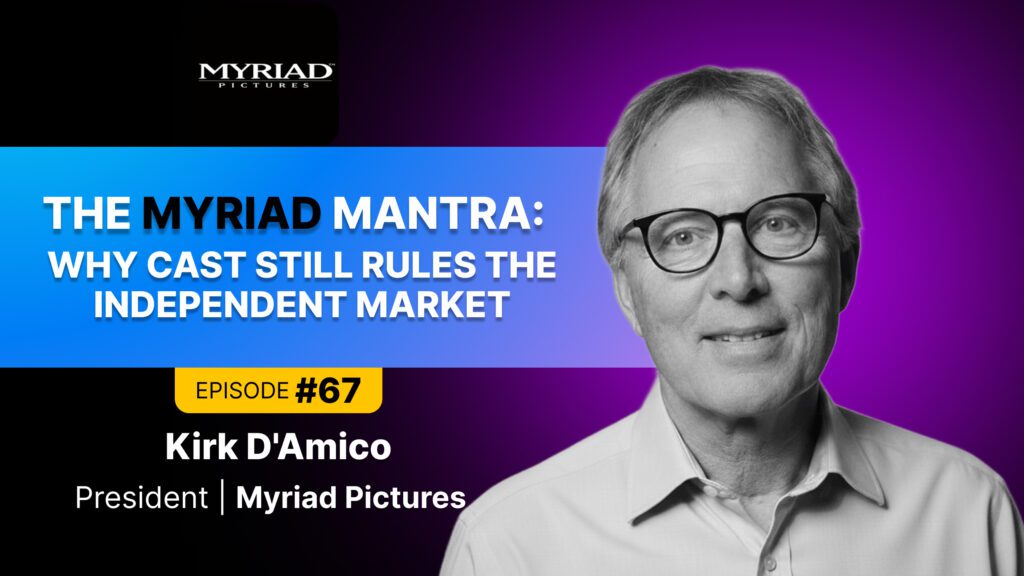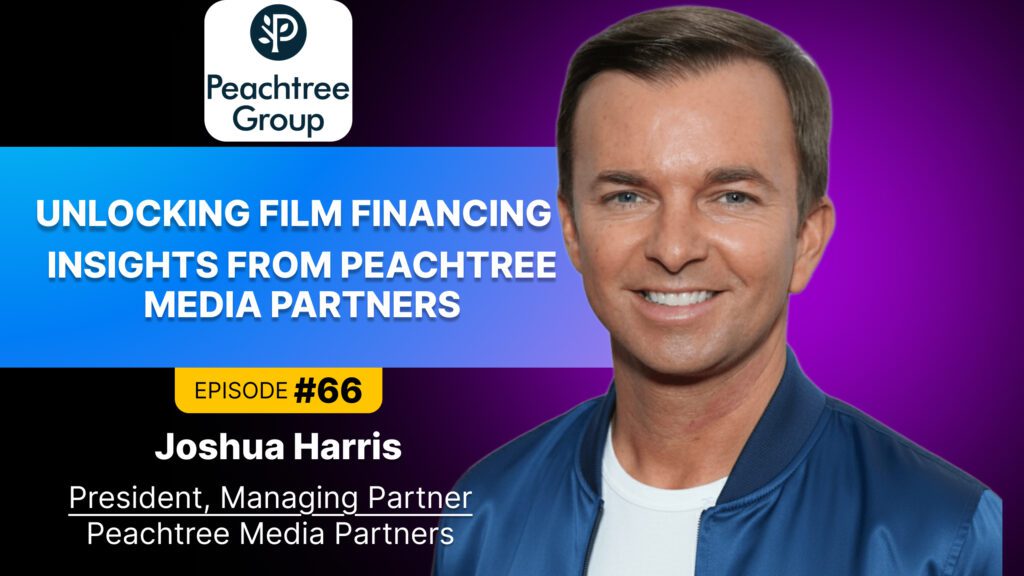In this episode of Vitrina Podcast, we welcome Renard Jenkins. He is the President and CEO of I2A2 Technologies, Labs and Studios, a firm specializing in ethically responsible solutions for various industries. He is also a seasoned executive in technology and media, serving as President of the Society of Motion Picture and Television Engineers (SMPTE),and has held leadership roles at Warner Bros., PBS, and other major organizations.
So I2A2 is the way that we look at our company: to be inclusive in the way that we innovate, help people integrate, advance technology, advise on its use, and ensure accessibility. We’re not just looking at individuals who are neurotypical but also the neurodiverse, creating a space for everyone. That is what I2A2 stands for.
Podcast Chapters
| Time | Topic |
| 00:00 | Introduction and Background |
| 03:04 | Creating Ethically Responsible Tools |
| 08:37 | The Importance of Standards |
| 12:55 | Challenges and Opportunities in Localization |
| 14:23 | The Role of Standards in the Supply Chain |
| 23:30 | The Changing Landscape of Viewer Preferences |
| 27:05:00 | Digital Transformation Challenges and Opportunities |
| 31:03:00 | Enhancing Storytelling through Audience Engagement |
| 32:31:00 | Responsible Use of Media |
| 34:06:00 | The Power of Engagement |
| 35:00:00 | Transmedia: Developing Content for Multiple Platforms |
| 39:46:00 | Applying Predictive AI in Workflows and Decision Engines |
| 42:42:00 | Optimizing Processes with Predictive AI |
| 46:03:00 | Change Management and Human Buy-In in AI Implementation |
| 50:47:00 | The Confluence of Creativity, Technology, and Engineering |
Financial advisors, who seem like geniuses, have long used predictive AI to foresee market trends. This technology relies on mathematics, statistics, and probability. No shade to financial advisors, but their tools predict favorable outcomes, similar to how predictive AI streamlines processes in the media and content creation industries. This technology optimizes the most valuable resource of any business: its people. Leaders must understand that supporting their workforce is crucial for longevity, and predictive AI facilitates this by making jobs easier and integrating processes across production, supply chain, localization, and distribution.
Key Takeaways:
- I2A2 Technology Labs and Studios focuses on creating ethically responsible tools to solve problems across multiple industries.
- Standards are crucial for interoperability and ensuring a streamlined supply chain.
- The digital transformation has brought challenges and opportunities, including the impact of streaming, the role of gaming engines, and the value of metadata and data analytics.
- Understanding audience engagement through biometrics and neuroscience can enhance storytelling and content creation.
- The responsible use of media is crucial in the digital transformation, and efforts should be made to close gaps in representation and change harmful portrayals.
- Engagement plays a significant role in various industries, including sports, entertainment, and gaming.
- Transmedia allows for the development of content that can be adapted across different platforms, enhancing creativity and reaching a wider audience.
- Predictive AI can be applied in workflows, decision engines, and optimization, streamlining processes and improving efficiency.
- Change management and human buy-in are essential when implementing AI solutions.
- The media industry is a confluence of creativity, technology, and engineering, and advancements in tools and techniques are constantly shaping the industry.
Sound Bites:
- “We do research and development and we are studios. The goal of what we focus on, we’re a software development company, you know, first and foremost.”
- “No matter how efficient we get something or we build something or we design something, there’s always going to be a way to make it more efficient.”
- “Localization is interesting, but if you enter it thinking that it’s just about changing the voice, you’ve already lost the balance.”
- “We have to be responsible in the way that we use this tool because we essentially control how others see the world.”
- “Engagement and measuring engagement is key in various industries.”
- “Transmedia is about developing content that can be adapted across different platforms.”
About SMPTE (Society of Motion Picture and Television Engineers):
SMPTE is a global society of more than 5,000 diverse and engaged members, including creative professionals, media technologists, and engineers. Members transform the industry through Standards Technology Committees with 800 engineering standards and guidelines developed to advance global interoperability of hardware and software; advance their careers through our vast educational offerings; and have access to our invaluable network of mentors and colleagues via local and global industry events. Collaboration leads to innovation, and SMPTE is proud to provide members a space to do both.
Networking Opportunities: Connect with media professionals, technologists, and engineers in various global hubs like Hollywood, New York, London, and Toronto.
Access to Cutting-Edge Standards: Stay updated with the latest SMPTE standards and recommended practices, which are vital for ensuring technical excellence in the media industry.
Educational Resources: Benefit from virtual courses, webcasts, and the award-winning SMPTE Journal to keep your knowledge and skills up-to-date.
Industry Events: Participate in SMPTE’s Media Technology Summit, local section meetings, and other events to learn about the latest innovations and trends in media technology.
Professional Recognition: Gain recognition through prestigious industry awards, and opportunities to contribute to influential committees and working groups focused on advancing media technology.
Vitrina:Title: The Future of Media Supply Chains: A Deep Dive with Renard T. Jenkins
Introduction:
This is a written version of the podcast featuring Renard T. Jenkins, hosted by Atul from Vitrina. Summarized for quick reading, this transcript-style Q&A covers Renard’s entrepreneurial journey, thoughts on AI, digital transformation, and the vital role of standards in media and entertainment — drawing from his rich background at Warner Bros., PBS, and his leadership at SMPTE.
- Vitrina: Tell us about your new venture, I2A2, and what you’re building there.
Renard T. Jenkins:
“I2A2 truly is a technology company. It’s a lab. We do research and development and we are studios. We’re a software development company first and foremost… a lot of our tools have byproducts that can work across verticals — media and entertainment, marketing and research, healthcare and education. Our goal is to make the best ethically responsible tools to solve the problems of our customers… and make technology easy for the artists and cost-effective for their business.”
- Vitrina: What part of the media supply chain excites you most from a problem-solving perspective?
Renard T. Jenkins:
“I started doing supply chain style design back in 2003… I’m most excited about closing the gaps… especially the amount of data we leave on the floor during production that never makes it into post. If we optimized that data, we could streamline the storytelling process. Another key idea is the digital backlot — how assets move across departments and their value versus where they can be of value. That connects to standards, formats, and pipeline architecture.”
- Vitrina: You mentioned seeing rapid growth in localization and animation tools. What stood out to you at HPA Tech Retreat?
Renard T. Jenkins:
“Localization has definitely taken off… people see the opportunity to streamline a taxing process and enhance actor representation globally. But there’s fear — will AI replace regional human voices that audiences have come to expect? Localization isn’t just about voice — it’s also about inflection, cultural context. If you’re only thinking about changing the voice, you’ve already lost the balance.”
- Vitrina: As president of SMPTE, what role do standards play in this evolving industry?
Renard T. Jenkins:
“Without standards, you lose interoperability across products, services, and applications, which breaks the supply chain. Open source isn’t the enemy — it’s the spark for innovation. But standards bring the industry together. If I pick up tool X, I want to know it’ll work with tool Z. Standards are the glue. Organizations like SMPTE and HPA work closely with others to create that safe space where everyone can benefit.”
- Vitrina: Streaming seems to have disrupted the traditional localization of standards. How is SMPTE addressing that?
Renard T. Jenkins:
“SMPTE is global — we have members everywhere. We invite everyone to the table… streaming has made it clear the world needs standards in the middle of a war. The reach is amazing, but financially it’s complex. Viewers now expect a la carte experiences, not two-year contracts. Streamers are realizing they missed opportunities while chasing eyeballs instead of building sustainable platforms. The need for global interoperability is greater than ever.”
- Vitrina: What are the biggest digital transformation challenges in the media industry right now?
Renard T. Jenkins:
“I’m pro-digital transformation. It creates space to create and makes the process more inclusive. But onboarding legacy (non-digital) assets is a huge gap. Metadata is valuable — we hyped it, then forgot to use it strategically. Now we need systems that can harness metadata and microservices in an organized way. Another key is the feedback loop — using biometrics and neuroscience to understand true content engagement, not just what people say but what they feel.”
- Vitrina: That brings us to engagement — do you see transmedia storytelling becoming the norm?
Renard T. Jenkins:
“Absolutely. Transmedia means content lives across film, games, social, and more. Storytellers today want IP that touches multiple consumer points. We help companies build tools and frameworks to think that way. Studios still work in silos — visual effects may not talk to sound, stages may not talk to post. There’s a handoff, not a handshake. Real transformation is about bringing people together, upstream and downstream.”
- Vitrina: Where does predictive AI fit into the transformation of media pipelines?
Renard T. Jenkins:
“Predictive AI is more important than generative AI in the supply chain. I need to know the next step in the pipeline. Predictive AI models help prevent bottlenecks. It’s like user acceptance testing on steroids. Tools like Nvidia’s Omniverse allow real-time feedback and simulation. It’s a safe space to test outcomes — a bit like Star Trek’s simulator.”
- Vitrina: How can predictive AI improve workflows, decision-making, and optimization?
Renard T. Jenkins:
“You hit the key areas: workflows, decision engines, and optimizers. Predictive AI prevents you from painting into a corner. But change management is critical. People fear change, and AI can help there too — some are more comfortable talking to an AI chatbot than a human. That insight could improve communication between departments.”
- Vitrina: Can predictive AI help with greenlighting and development decisions?
Renard T. Jenkins:
“Yes. Give me historical data and our content engagement data, and I can model how a project might land. Our tools combine biometric feedback with behavioral engagement to forecast potential reception. It’s early, but we’re already helping companies test this. And yes, if you want to invest — shameless plug — please reach out!”
- Vitrina: You mentioned your company’s name, I2A2. What does it stand for?
Renard T. Jenkins:
“I2A2 stands for Intelligent Innovation, Accessibility, Advisory, and also Inclusion, Integration, Automation, and Advancement. It’s about inclusive innovation — building accessible, responsible technology for everyone. That includes neurodiverse creators too. Everyone has a role to play in shaping this ecosystem.”
- Vitrina: Any final thoughts on the convergence of creativity and technology?
Renard T. Jenkins:
“Game engines have opened the door. Artists can now see animated characters rendered in real time. Performances improve, animators have clearer reference points, and storytelling becomes more authentic. We’re blending science, engineering, and art. This is a wonderful time to play — a creative renaissance powered by technology.”





 White Plains, United States of America
White Plains, United States of America




